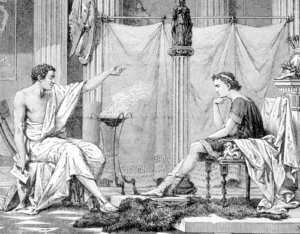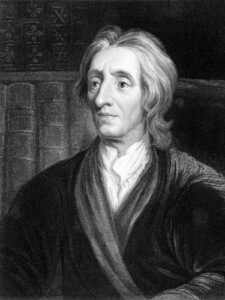If you haven’t been challenged by the LSAT reading comprehension section yet, you’re either an amazing reader (congratulations!) or you haven’t started your LSAT reading practice! Many students feel reading comprehension is their hardest section on the LSAT. Why? Mainly for its difficult vocabulary, complex sentence structure, and high-level subject matter. So, one of the best ways to prepare for this section is to get used to reading challenging material. The more comfortable you are understanding upper-level writing, the smoother you’ll be able to read on the LSAT.
LSAT Reading Practice: Legal Philosophers
Reading the work of legal philosophers is a great way to increase your reading proficiency and get your LSAT reading practice done. You’ll be reading at the same level or higher in reading comprehension passages. Plus, you’ll be preparing yourself for the ideas you’ll encounter in law school.

Aristotle
Aristotle is a great philosopher to begin with because he is considered the father of logic. He is a major figure in Western thought and contributed to not only logic, but:
- Metaphysics
- Mathematics
- Physics
- Biology
- Botany
- Ethics
- Politics
- Agriculture
- Medicine
- Dance
- Theatre
Take note that you’d be reading high-level ideas translated from Classical Greek if you choose to tackle this. If you go into it understanding that you’re building your stamina as far as reading and comprehending “thick” material, recognize that it is difficult material that may pose a challenge to you, and you’re patient with yourself — you should perform better.
St. Thomas Aquinas
St. Thomas Aquinas is another major figure of philosophy. He was a Catholic priest and a leader on the concept of natural law, which claims that there are rights and values inherent in being human. Naturally, as a priest, he wrote mostly on God and mankind’s relationship to God. He was also a major thinker on ethics.
His writings are important to you because natural law theory is a way legal thinkers can create and interpret civil laws. For example, in the U.S., “The U.S. Declaration of Independence states that it has become necessary for the people of the United States to assume ‘the separate and equal station to which the Laws of Nature and of Nature’s God entitle them’.”
In the past, “when the Roman jurists were looking for legal concepts that could apply throughout the Roman empire, they turned to the philosophy of natural law precisely because it proposed that certain ethical laws are ‘natural’ rather than ‘conventional’; that is, they apply equally to all human beings, regardless of the conventions, customs, or beliefs of their particular society. These natural laws for all human behavior thus could serve as a basis for judging the actions of people throughout the Roman empire.”

Finally, people consider Aquinas’ writing, The Summa Theologica, to be his greatest work. “It is the fullest presentation of his views.” If you’re ready to dive into some classic philosophical writing, you can read the Summa here.
(This reading is also a useful discussion on legal positivism vs. natural law theory.)
Thomas Hobbes
Thomas Hobbes has been praised for how his writing is still relevant today. In short, “for Hobbes, the only way for man to lift himself out of his natural state of fear and violence was to give up his freedom and make a social contract with others to accept a central authority.”
You can read his major work, Leviathan, here! Interestingly, Hobbes based his writing in Leviathan on a series of indisputable steps, like he observed in geometry. This closely relates to reaching a conclusion on the LSAT through a logical chain.
John Locke
Our next philosopher worth reading, John Locke, is considered one of

the founders of liberal political philosophy. Locke’s philosophical ideas center around the premise that human beings are independent and responsible for their own survival. However, the world is also an insecure place where people’s rights are usually under threat. So, for protection, people bind together through government. But to respect individuals’ liberty, government should not impede on individual rights.
At the same time, people have a duty to respect each other and shouldn’t ignore this duty. “A liberal system such as ours enshrines individual rights, but its health depends upon people exercising those rights responsibly. It depends on people taking seriously their duty to respect the rights of others.”
To explore these ideas in depth, read John Locke’s Second Treatise on Government.
Ronald Dworkin
Finally, Ronald Dworkin is a modern-day legal philosopher who some consider to be “The Most Important Legal Philosopher of Our Time.” He pointedly compared judging in the legal system to writing a chapter in a chain novel. If several writers have written chapters before you, you can’t suddenly write whatever you’d like. Your contribution has to at least reference what came before. But at the same time, you have some freedom because it’s a new chapter. You don’t have to repeat exactly what came before. You should interpret it.
That’s how Ronald Dworkin thought of complicated modern issues like whether states should recognize same-sex marriages. His philosophical writings helped clarify the issue of legal precedents. You can buy his books on Amazon, or read his book Laws of Empire here.
Remember to Read Consistently!
Now that you’re more familiar with these five legal philosophers, the next step is to read regularly and actively improve your vocabulary. If you keep this LSAT reading practice up, you should find your practice scores increasing in no time!
Do you know any other great legal philosophers that we should take a look at? Comment below!





